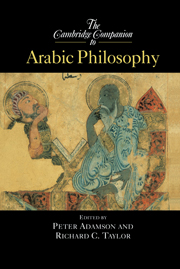Book contents
- Frontmatter
- 1 Introduction
- 2 Greek into Arabic
- 3 Al-Kindī and the reception of Greek philosophy
- 4 Al-Fāarābī and the philosophical curriculum
- 5 The Ismāīlīs
- 6 Avicenna and the Avicennian Tradition
- 7 Al-Ghazālī
- 8 Philosophy in Andalusia
- 9 Averroes
- 10 Suhrawardī and Illuminationism
- 11 Mysticism and philosophy
- 12 Logic
- 13 Ethical and political philosophy
- 14 Natural philosophy
- 15 Psychology
- 16 Metaphysics
- 17 Islamic philosophy and Jewish philosophy
- 18 Arabic into Latin
- 19 Recent trends in Arabic and Persian philosophy
- Select bibliography and further reading
- Index
16 - Metaphysics
Published online by Cambridge University Press: 28 May 2006
- Frontmatter
- 1 Introduction
- 2 Greek into Arabic
- 3 Al-Kindī and the reception of Greek philosophy
- 4 Al-Fāarābī and the philosophical curriculum
- 5 The Ismāīlīs
- 6 Avicenna and the Avicennian Tradition
- 7 Al-Ghazālī
- 8 Philosophy in Andalusia
- 9 Averroes
- 10 Suhrawardī and Illuminationism
- 11 Mysticism and philosophy
- 12 Logic
- 13 Ethical and political philosophy
- 14 Natural philosophy
- 15 Psychology
- 16 Metaphysics
- 17 Islamic philosophy and Jewish philosophy
- 18 Arabic into Latin
- 19 Recent trends in Arabic and Persian philosophy
- Select bibliography and further reading
- Index
Summary
Metaphysics, first philosophy, or divine science has always been a subject of controversy. Too often medieval Arabic metaphysics is regarded as either simply a paraphrase of or a commentary on Aristotle’s Metaphysics, or a curious and rather unsuccessful blend of Aristotelian metaphysics and Neoplatonism. Cristina D'Ancona has shown the superficiality of this latter approach by highlighting how carefully and creatively the “falāsifa” or Hellenizing philosophers used the various Greek sources, such as the works of Aristotle, the Plotiniana Arabica (a group of texts based on Plotinus and including the so-called Aristotle’s Theology derived from Enneads IV-VI), and the Liber de Causis, adapted from Proclus' Theology and known in Arabic as The Book of the Pure Good. Yet Greek sources are not enough to explain some developments. In 1979 Richard Frank argued that falsafa (the Arabic transliteration of the Greek term for philosophy, highlighting its foreign origin) is not immune to the influence of kalāmor Islamic theology, which had elaborated an ontology of its own. More recently, though controversially, he has argued that even al-Ghazālī, the famous author of the Incoherence of the Philosophers and the staunch protector of orthodox Sunni Islam, is himself deeply influenced by Avicenna.
- Type
- Chapter
- Information
- The Cambridge Companion to Arabic Philosophy , pp. 327 - 348Publisher: Cambridge University PressPrint publication year: 2004
- 2
- Cited by

